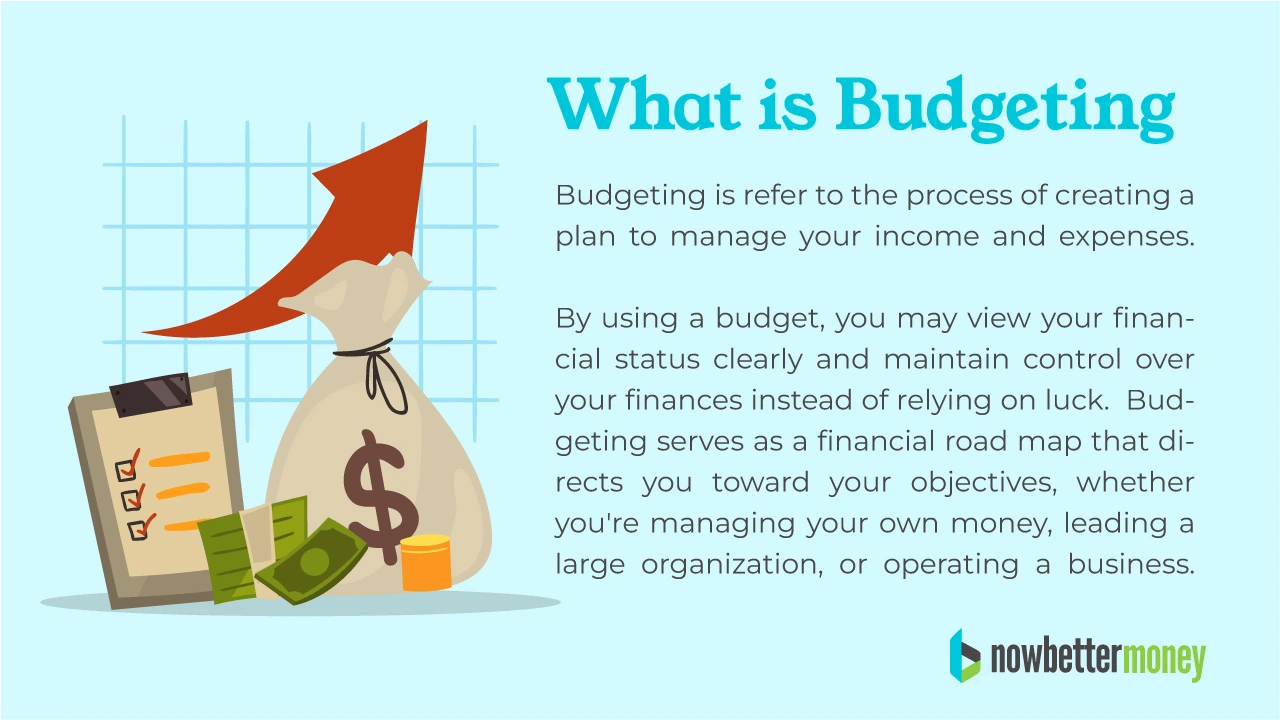What is Budgeting? Understanding the Fundamentals
Have you ever thought, “Where did all my money go?” at the end of the month? You’re not by yourself. At some time in their lives, the majority of people wonder how their money can go so rapidly. Even when you put in a lot of effort and receive compensation, it seems like the money eludes you. In actuality, how you handle your income matters more than how much you earn. Budgeting then becomes important. Being frugal or never spending money on things you enjoy is not the goal of budgeting. It’s about managing your finances purposefully so that you can afford the things that are most important to you now and in the future.
In this blog post, we’ll go over everything you need to know to begin budgeting in this blog post. This is your straightforward, beginner-friendly approach to creating a budget that truly works for you, regardless of whether you’ve never made one before or are attempting to get back on track.
What Is Budgeting

Budgeting is refer to the process of creating a plan to manage your income and expenses.
By using a budget, you may view your financial status clearly and maintain control over your finances instead of relying on luck. Budgeting serves as a financial road map that directs you toward your objectives, whether you’re managing your own money, leading a large organization, or operating a business.
There are many benefit to budgeting. In the first place, it assists you in setting spending priorities so that your funds are allocated to the most important items. Additionally, it lessens financial stress, helps you avoid needless debt, and enhances your capacity to save for future requirements. Overall, budgeting improves confidence in financial decision-making and fosters financial discipline.
Brief All Types of Budgeting
There are several types of budgeting methods, each serving different needs and situations. Here’s a brief overview:
Key Components of a Budget
Many people always ask about, what are some key components of successful budgeting? A budget must include a number of essential elements. Each of these components functions as a parameter, assisting in the organization and direction of the budget’s structure. Let’s review each one quickly using some basic examples:
How to Create a Budget
Creating a budget may appear difficult at first, but it is actually a simple step-by-step procedure. You may create a budget that suits your lifestyle, helps you achieve your goals, and minimizes financial stress by adhering to a defined structure. Here’s how you do it:
1. Calculate Your Total Income
Start by calculating your monthly income. Include all sources, such as your paycheck, freelance employment, investments, and any side projects.
Example: If you make $3,200 from your primary work and $400 from part-time tutoring, your total monthly income is $3,600.
2. List all your expenses.
Write out all of your monthly expenses, categorizing them as fixed or variable.
For example, your fixed expenses could be $1,000 in rent and $150 in insurance, whereas variable expenses could be groceries, transportation, and entertainment.
3. Set financial goals
Determine what you hope to achieve with your budget. Your goals may be short-term (saving for a vacation) or long-term (establishing an emergency fund or paying off debt). For example, you may set a monthly savings goal of $500 for a down payment on a house.
Sticking to a Budgeting
Creating a budget is only half the battle; the majority of individuals fail to keep to it consistently. The key to keeping on track is to build excellent habits, discipline yourself, and be proactive in adapting to life’s challenges. Here are nine important suggestions to help you stay to your budget successfully:
1. Set realistic goals.
Setting overly ambitious goals can lead to dissatisfaction and eventually burnout. When your goals appear unattainable, you may begin to feel like giving up, which is the last thing you want. Setting realistic and doable goals will help you stay motivated and improve your chances of achievement.
How To Do It: Rather than aiming for big changes, concentrate on modest gains. For example, if you’re new to budgeting, start by saving 5% of your monthly income and gradually increase it as you become more comfortable. Track your goals and celebrate tiny victories along the way, such as attaining a savings milestone.
2. Keep track of every expense.
One of the most crucial components of sticking to a budget is keeping track of where each dollar goes. Small expenses, such as coffee or snacks, are easy to ignore, but they add up rapidly and can derail your budget if not managed. Tracking every expense increases your awareness of your spending habits and allows you to identify potential problems early.
3. Prioritize Needs Over Wants.
It’s easy to spend money on items you don’t need, especially if there’s an emotional or social trigger. Impulse purchases can easily ruin a well-planned budget. Prioritizing necessities (things you can’t live without) over desires (things you can live without) keeps you focused on what’s truly important.
4. Use the cash envelope system.
The cash envelope system is a tried-and-true strategy for controlling expenditure that involves physically splitting your cash into certain categories (such as grocery, entertainment, and transportation). When the cash in the envelope runs out, you discontinue spending in that area.
5. Prepare for unexpected expenses.
Life is uncertain. Unexpected expenses, such as auto repairs, medical bills, or even a last-minute travel, might derail your budget if you’re not prepared. Having an emergency fund or a flexible buffer built into your budget will relieve the burden of unexpected expenses.
6. Review Your Budget Regularly
A budget is a living document that should adapt to your changing circumstances. Whether your income changes, you get a raise, or your spending alter, you must examine your budget on a regular basis to ensure that it accurately reflects your current financial status. Regular reviews allow you to stay on track and make required changes before things get out of control.
7. Reward Yourself
Everyone feel budgeting is difficult at times, but if you don’t reward yourself for achieving goals, you’re likely to burn out and abandon your plan entirely. Small, meaningful rewards help you stay motivated and make the process less of a nuisance.
8. Avoid unplan buying
Unplan buying can easily drain your budgeting motivation. Whether it’s a trendy gadget or a fast snack at the shop, Unplan buying can lead to overspending. You can have more control over your spending by developing ways to avoid Unplan buying.
9. Stay positive and be patience.
Budgeting is a long-term goal, and results don’t necessarily appear in day one. Don’t be disappointed if you make mistakes; perfection isn’t the your goal. Instead, focus on development and realize that even minor gains add up. The more consistently you follow your plan, the more natural it will appear.
Common Budgeting Mistakes
While setting and sticking to a budget is an important first step toward reaching financial security, many people run into difficulties during this process. These blunders might result in financial issues, disappointment, and unmet goals. Recognizing these typical dangers allows you to avoid them and stay on track with your financial goals. This document provides a thorough assessment of 15 budgeting problems, as well as suggestions for avoiding them.
1. Underestimating expenses.
Everyone always miss little or unusual expenses while creating a budget. People usually focus on standard monthly payments such as rent or electricity, but ignore to account for some yearly subscriptions, seasonal expenses (such as air conditioning in the summer or heating in the winter), and one-time events such as birthdays. These overlooked expenses may accumulate, causing financial problems.
2. Not accounting for emergency expenses.
Emergency situations are unavoidable, whether it’s a car breakdown, a hospital expense, or an urgent house repair. Without an emergency fund, even a minor unexpected expense might knock your entire budget off course. Many people simply disregard the potential of an emergency, believing they will be able to cover it later, which can lead to debt or financial hardship.
3. Setting unrealistic goals.
When you’re concerned about budgeting too much, it’s accidently to make some missing objectives like saving half of your income or paying off all debt in three months. However, setting unreasonable goals might lead to feel burn out and lose your motivation to financial goal. If your ambitions are too much, you will create a lot of mistake during setting your goal.
4. Forgetting to track little purchases.
Many people always overlook a small daily expenses, thinking that they don’t cause your budget too much. Small expenses, such as daily coffee, snacks, or occasional lunches out, can have a major influence on your budget over time. These tiny items can make for a larger amount of your budget than your estimation.
5. Failing to Adjust Your Budget.
Life is always change, and your budget must change accordingly. If you keep to the same budget despite changes in your income, expenses, or financial goals, you are going to be fail in budgeting in future. People frequently fail to make adjustments and then wonder why they are overpaying or falling behind on savings.
6. Ignoring Variable Expense
Not every expense is fixed. Utility bills, petrol, groceries, and dining out can vary from month to month. When you don’t account for this unpredictable change in your budget, you might go into risk, overspending or underestimating how much money you need.
7. Relying too heavily on credit cards
Credit cards enable you to spend money that you do not have, which is both convenient and perilous. If you use credit cards regularly and do not pay them off in full each month, you will end up with debt and high interest payments. If not handled appropriately, this can easily lead to financial problems.
8. Not Including Money for Leisure.
A budget that focuses fully on needs and savings, but missing a money for leisure or hobbies, can lead you feel budget is annoyance and then give up. Without a specific allocation for leisure or entertain, you may feel unhappy and eventually quit your budget entirely. Everyone needs some enjoyment in their lives!
9.Being too unspecific.
unspecific goals such as “spend less” or “save more” are ineffective because they lack definition and focus. It is difficult to remain focused and motivated when there are no concrete metrics or targets. For example, “spend less on dining out” is too broad to measure and implement.
10. Miss Communicate with family or partners
Budgeting with a partner or family requires everyone to be on the same goal. Many budgeting issues start from a lack of financial communication and cooperation. Without a common knowledge of financial goals and constraints, it is simple to overspend or make contradictory financial judgments.
11. Living Paycheck to Paycheck.
Living paycheck to paycheck is puts yourself at risk of financial stress due to expected expanse. Without saving or budgeting for future months, you may find yourself constantly speeding to pay expenses or delaying some important spending. This cycle might result in debt and a lack of financial stability.
12. Forget to budget for annual subscription
The most people always fail to budget at annual subscription or infrequent expenses such as insurance premiums, taxes, or Internet subscriptions. These can be forget by majority of people and then it can cause your budget become larger amount when this subscription month arrive.
13. Comparing yourself to others.
It’s easy to lose motivation when you compare your own financial condition to others, especially nowadays, Best living people always show off on social media. This can lead you to overspending in order to stay up or feeling like you’re not doing enough.
14. Make Mistake and Give Up
Budgeting is a learning process, you can not give up your whole process because of a little mistake that appear accidentally. However, many people give up their budget completely after making a mistake, they always think that mistake will make their goal not achieve as their planning at the beginning and then they give up.
15. No Specific Tracking System
A budget without progress tracking can feel like an endless effort with no reward. Not seeing the results from your trying, may make you lose motivation day by day, until feel budget is useless.
Tools & Apps for Better Budget Management
Budgeting is much easier when you have the correct tools and system. Whether you prefer basic spreadsheets or feature-rich programs, there is something for everyone. Here are some best tools and app for budgeting that can help you stay organized and on track with your financial plan:
1. Excel Spreadsheet (free download)
If you value simplicity and complete control over your figures, an Excel spreadsheet is an excellent choice. I’ve prepared a free, user-friendly budgeting spreadsheet that you can download and use right away. It’s ideal for tracking your monthly success while also setting income, expenses, and savings objectives. (Get the free spreadsheet [here — insert your link].)\
2. Notion Budget Templates
For individuals who prefer a digital and easy to organize experience, Notion is a fantastic budget management application, but you have to understand Notion for building your budgeting system. Fortunately, I have built two customizable Notion templates:
3. Mint
Mint is among the most popular free budgeting apps. It automatically links to your bank accounts, categorizes your purchases, and displays where your money goes. You may create objectives, receive bill reminders, and even watch your credit score – all for free.
4. You Need a Budget (YNAB)
YNAB is a premium app, but it comes highly recommended for those serious about budgeting. It allows you to assign each dollar a purpose, encourages saving, and provides educational tools to help you modify your spending patterns. Many people believe it changes the way they manage their cash.
5. PocketGuard
If you frequently question, “How much can I safely spend today?” PocketGuard is for you. It connects to your bank accounts, automatically analyzes your payments and spending habits, and displays how much money you have available for guilt-free shopping.
6. Good budget.
Goodbudget follows the old envelope approach, but digitally. It’s ideal for couples or individuals who want to budget ahead of time, particularly for variable expenses such as groceries or entertainment.
7. Personal Capital
While Personal Capital is best recognized for investment tracking, it also has a powerful budgeting tool. It allows you to track your spending and net worth, providing a more complete picture of your financial situation.
Final Thoughts & Conclusion
Budgeting is more than just keeping track of your expenses; it is about making a plan for your financial future. Understanding the fundamentals of budgeting, identifying frequent mistakes, and learning how to stick to your plan will help you achieve financial success. Whether you’re just getting started to improve your budgeting , the tools and tactics mentioned in this post can help you get control of your finances and reach your objectives.
Remember that sticking to a budget is an ongoing process, not a one-time chore. You have to be consistency, flexible, and more patience. Moreover, with the correct tools—such as Excel spreadsheets, Notion templates, and budgeting apps—You can make the process easier and more efficient. Don’t forget to check your progress on a regular basis, appreciate little achievement , and stay focused on your long-term goal.
Start small, stay motivated, and watch as you achieve the financial security and independence you’ve always desired. Your future self will appreciate you!

NowBetterMONEY, where is a hub shares practical tips on budgeting, saving, and debt management. I uses a personal finance tracker to monitor spending and savings, helping readers take control of their finances and build long-term financial stability with simple, actionable strategies. Author Bio


